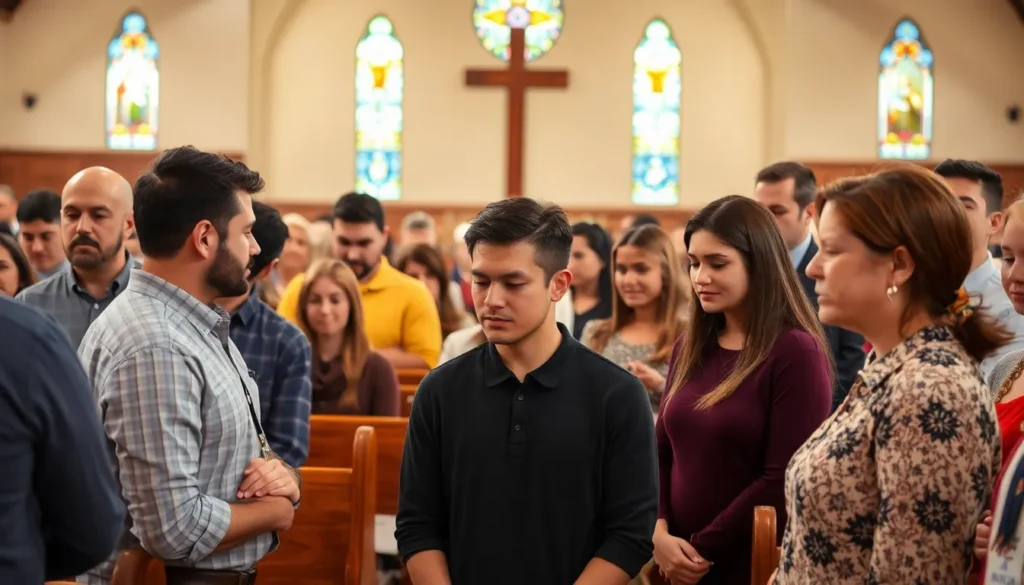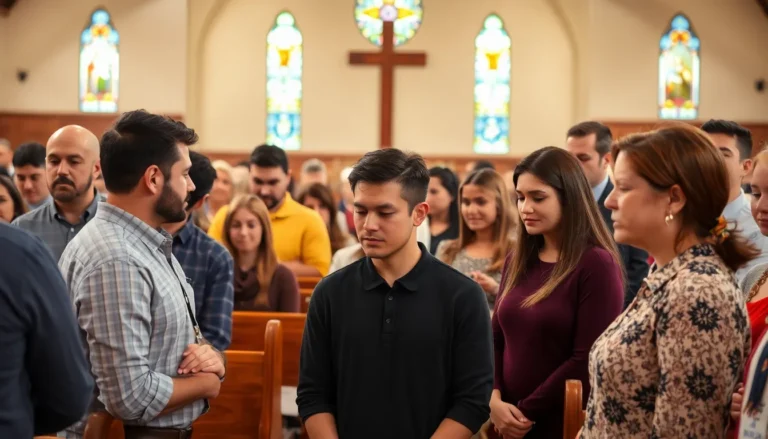As the calendar flips to 2025, many are gearing up for a day that’s as significant as it is symbolic: Ash Wednesday. This day marks the beginning of Lent, a season of reflection and renewal for millions around the world. But what exactly is Ash Wednesday? It’s not just about smudged foreheads and solemn faces; it’s an invitation to embrace a journey of self-discovery and spiritual growth.
Picture this: people flocking to churches, getting a little dirt on their foreheads, and pondering life’s big questions. While it might sound a bit messy, it’s all part of a time-honored tradition that encourages individuals to hit the reset button. So, whether you’re a seasoned participant or just curious about the hype, let’s dive into the significance of Ash Wednesday 2025 and why it deserves a spot on your calendar.
Table of Contents
ToggleWhat Is Ash Wednesday 2025
Ash Wednesday in 2025 falls on February 14, marking the commencement of Lent. This day holds significant importance for many Christians worldwide. On Ash Wednesday, individuals gather in churches to partake in various traditions, including the receiving of ashes. The ashes, made from burnt palm branches, symbolize mortality and repentance.
Participants typically engage in a period of fasting and reflection during Lent, lasting 40 days until Easter Sunday. Emphasis on personal growth and spiritual renewal arises among congregations. Many people contemplate their faith and address important life questions during this time.
Church services often feature the imposition of ashes, where a minister applies a cross of ashes on the forehead of each attendee. This act serves as a reminder of human fragility and the call to repentance. Attendance at these services is usually high, as communities gather to support one another in their spiritual journeys.
Many denominations, including Roman Catholics, Anglicans, and certain Protestant groups, observe Ash Wednesday. Additionally, different traditions and services may exist within these denominations, reflecting diverse practices surrounding Lent.
Through its rich symbolism and communal aspects, Ash Wednesday fosters a deeper connection among participants. As people embark on this season of penance and introspection, it becomes a pivotal moment for renewal and spiritual exploration in their lives.
Significance of Ash Wednesday

Ash Wednesday marks a significant moment for reflection and spiritual renewal, starting Lent on February 14, 2025.
Religious Importance
Ash Wednesday holds deep religious significance within Christian communities. Many congregations participate in the ritual of receiving ashes, which symbolize repentance and human mortality. The ashes, often derived from burnt palm branches, serve as a reminder of the call to return to faith. Individuals contemplate their spiritual journey during this day, initiating a 40-day period of fasting and prayer leading up to Easter Sunday. Churches see increased attendance, as many come together to seek forgiveness and renewal in their faith. This communal worship strengthens bonds among participants, highlighting the importance of shared spiritual endeavors.
Cultural Observances
Cultural observances of Ash Wednesday vary across denominations. Roman Catholics, Anglicans, and specific Protestant groups participate in distinctive rituals. Receiving ashes on the forehead is common, accompanied by the phrase “Remember that you are dust, and to dust you shall return.” Some communities emphasize the importance of fasting, abstaining from certain foods as a form of penance. Social gatherings may occur, where individuals share their reflections on personal growth and faith. Throughout these traditions, Ash Wednesday fosters unity and a collective commitment to spiritual exploration.
Ash Wednesday Traditions
Ash Wednesday traditions hold deep significance for many religious communities. These practices center around themes of reflection, penitence, and spiritual revival.
Ashes and Their Meaning
Ashes play a central role on Ash Wednesday, symbolizing mortality and humility. Derived from burnt palm branches, they are applied to the forehead in the shape of a cross. This action signifies a commitment to repentance, reminding individuals of their human fragility. The phrase “Remember that you are dust, and to dust you shall return” reinforces this message during the ritual. Throughout various denominations, the use of ashes conveys a collective call to return to faith and introspection.
Fasting and Abstinence
Fasting and abstinence form important aspects of Ash Wednesday observances. Many individuals choose to refrain from specific foods or activities as a form of penance. The tradition emphasizes personal sacrifice, intending to cultivate spiritual growth during Lent, which lasts 40 days. Different communities adopt diverse practices, such as skipping meals or avoiding certain foods. This period encourages individuals to focus on prayer and self-examination, allowing for a deeper connection to their faith. By participating in fasting, they engage more profoundly in their spiritual journeys.
Key Dates and Calendar for 2025
Ash Wednesday in 2025 falls on February 14. This date marks the start of Lent, leading up to Easter Sunday. Lent spans a total of 40 days, providing a period of personal reflection and spiritual preparation.
Easter Sunday will be observed on March 31, 2025, concluding the Lenten season. Other significant dates include Palm Sunday on March 24, and Maundy Thursday on March 28. These dates are important for the liturgical calendar and signify various events in the Christian tradition.
Church services will typically see an increase in attendance on Ash Wednesday, emphasizing communal support. Participants will also note the varied customs across denominations. Roman Catholics, Anglicans, and several Protestant groups engage in unique Ash Wednesday traditions.
Communities will often organize special services to distribute ashes, marking a profound moment of faith. The ashes serve as a symbol of repentance, reminding individuals of their mortality. Each service usually includes the recitation of the phrase related to human fragility.
Fasting and abstinence play essential roles throughout Lent, starting on Ash Wednesday. Individuals frequently choose to forgo specific foods or behaviors as an act of penance. This practice reinforces the commitment to spiritual growth and deeper self-examination during the season.
Overall, the calendar for 2025 includes critical dates that resonate deeply with those participating in Lent and its associated observances. Understanding these key dates enhances the significance of the Lenten journey for individuals and communities alike.
Ash Wednesday in 2025 offers an opportunity for individuals to embrace a season of reflection and spiritual renewal. As communities come together in faith, the rituals and traditions surrounding this day foster a deeper understanding of life’s fragility and the importance of repentance. The journey through Lent, culminating in Easter, encourages personal growth and a stronger connection to one’s beliefs. With its rich symbolism and communal support, Ash Wednesday sets the tone for a transformative period that resonates with many. Engaging in this spiritual practice can lead to meaningful insights and a renewed commitment to faith.









